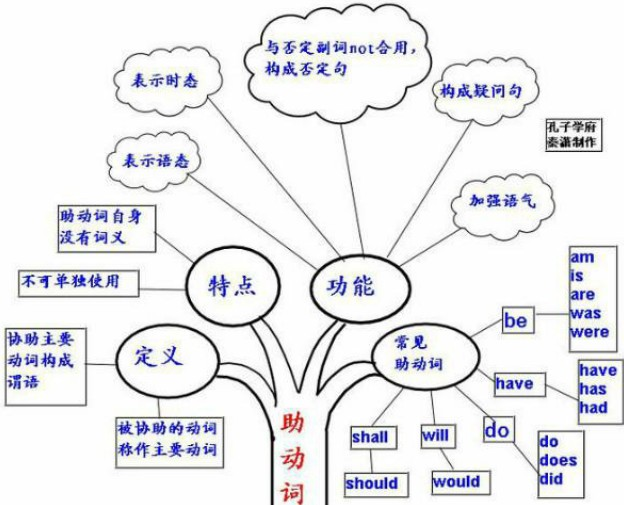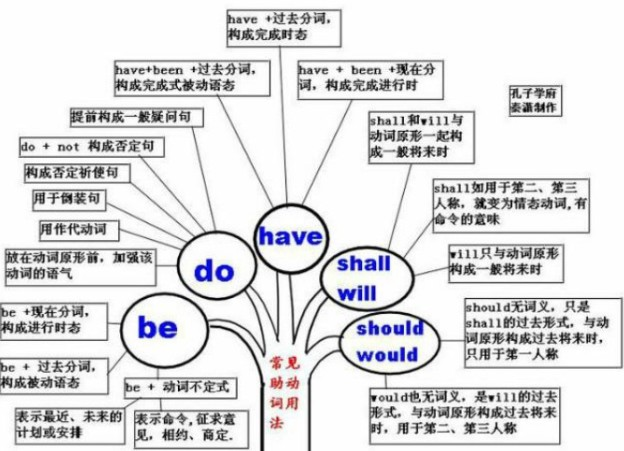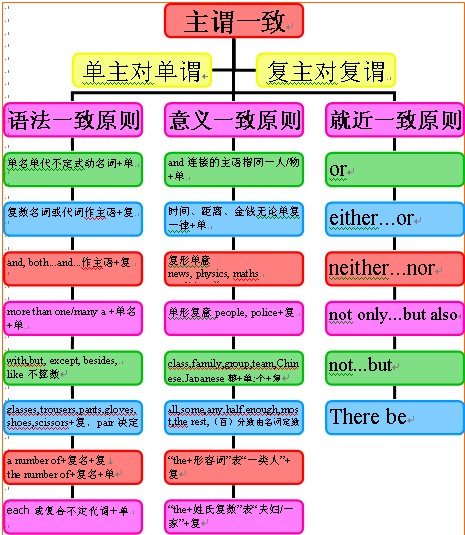本试题 “His pale face suggested that he _____, and his wife urged that he ____ a medical examination.[ ]A. doesn't feel himself; haveB. not feel himself; h...” 主要考查您对助动词
主谓一致
等考点的理解。关于这些考点您可以点击下面的选项卡查看详细档案。
- 助动词
- 主谓一致
助动词的概念:
助动词是帮助主要动词构成各种时态,语态,语气以及否定或疑问结构的动词。助动词分为时态助动词和结构助动词两种。
助动词的用法:
1、助动词be的用法:
1)be+现在分词,构成进行时态。
例如:They are having a meeting. 他们正在开会。
English is becoming more and more important. 英语现在越来越重要。
2)be+过去分词,构成被动语态。
例如:The window was broken by Tom. 窗户是汤姆打碎的。
English is taught through out the world. 世界各地都教英语。
3)be+动词不定式,可表示下列内容:
a. 表示最近、未来的计划或安排。
例如:He is to go to NewYork next week. 他下周要去纽约。
We are to teach the freshmen. 我们要教新生。
说明:这种用法也可以说成是一种将来时态表达法。
b. 表示命令。
例如:You are to explain this. 对此你要做出解释。
He is to come to the office this afternoon. 要他今天下午来办公室。
c. 征求意见。
例如:How am I to answer him? 我该怎样答复他?
Who is to go there? 谁该去那儿呢?
d. 表示相约、商定。
例如:We are to meet at the schoolgate at seven tomorrow morning. 我们明天早晨7点在校门口集合。
2、助动词have的用法:
1)have+过去分词,构成完成时态。
例如:He has left for London. 他已去了伦敦。
By the end of last month, they had finished half of their work. 上月未为止,他们已经完成工作的一半。
2)have+been+现在分词,构成完成进行时。
例如:I have been studying English for ten years. 我一直在学英语,已达十年之久。
3)have+been+过去分词,构成完成式被动语态。
例如:English has been taught in China for many years. 中国教英语已经多年。
3、助动词do的用法:
1)构成一般疑问句。
例如:Do you want to pass the CET? 你想通过大学英语测试吗?
Did you study German? 你们学过德语吗?
2)do+not构成否定句。
例如:I do not want to be criticized. 我不想挨批评。
He doesn't like to study. 他不想学习。
In the past, many students did not know the importance of English. 过去,好多学生不知道英语的重要性。
3)构成否定祈使句。
例如:Don't go there. 不要去那里。
Don't be so absent-minded. 不要这么心不在焉。
说明:构成否定祈使句只用do,不用did和does。
4)放在动词原形前,加强该动词的语气。
例如:Do come to my birthday party. 一定来参加我的生日宴会。
I did go there. 我确实去那儿了。
I do miss you. 我确实想你。
5)用于倒装句。
例如:Never did I hear of such a thing. 我从未听说过这样的事情。
Only when we begin our college life do we realize the importance of English. 进了大学以后,我们才认识到英语的重要性。
说明:引导此类倒装句的副词有never, seldom, rarely, little, only, so, well等。
6)用作代动词。
例如:—Do you like Beijing? 你喜欢北京吗?
—Yes, I do. 是的,喜欢。(do用作代动词,代替like Beijing.)
He knows how to drive a car, doesn't he? 他知道如何开车,对吧?
4、助动词shall和will的用法:
shall和will作为助动词可以与动词原形一起构成一般将来时。
例如:I shall study harder at English. 我将更加努力地学习英语。
He will go to Shang hai. 他要去上海。
说明:在过去的语法中,语法学家说shall用于第一人称,will只用于第二、第三人称。现在,尤其是在口语中,will常用于第一人称,但shall只用于第一人称,如用于第二、第三人称,就失去助动词的意义,已变为情态动词。
试比较:He shall come. 他必须来。(shall有命令的意味。)
He will come. 他要来。(will只与动词原形构成一般将来时。)
5、助动词should,would的用法:
1)should无词义,只是shall的过去形式,与动词原形构成过去将来时,只用于第一人称。
例如:I telephoned him yesterday to ask what I should do next week. 我昨天给他打电话,问他我下周干什么。
比较:"What shall I do next week?" I asked. “我下周干什么?”我问道。
可以说,shall变成间接引语时,变成了should。
2)would也无词义,是will的过去形式,与动词原形构成过去将来时,用于第二、第三人称。
例如:He said he would come. 他说他要来。
比较:"I will go," he said. 他说:“我要去那儿。”变成间接引语,就成了He said he would come。原来的will变成would,go变成了come。
助动词知识体系:

常见的助动词用法解析:

主谓一致的概念:
谓语的数必须和主语的人称和数保持一致,这就叫主谓一致。
主谓一致的基本原则:
1)语法一致原则,即在语法形式上取得一致。例如,主语是单数形式,谓语动词也采取单数形式;主语是复数形式,谓语动词也采取复数形式。
例如:The students are very young.
This picture looks beautiful.
2)意义一致原则,即从意义着眼处理一致关系。例如,主语形式虽是单数但意义是复数,谓语动词也采取复数形式;
而有些主语形式虽是复数但意义上看作单数,谓语动词也采取单数形式。
例如:The people in that country are fighting for independence.
The crowd deeply respect their leader.
Three years in a strange land seems a long time.
3)就近原则,即谓语动词的单数或复数形式取决于最靠近它的词语。
例如:Neither hen or I am going to see the film tonight because we are busy.
几对容易混淆词组的一致用法:
1、由“this/thatkind/typeof+名词”作主语,谓语动词用单数形式;而由"these/thosekind/typeof+复数名词”作主语,谓语动词用复数形式。
例如:This kind of apples is highly priced.
Those kind(s) of tests are good.
2、由“a number of,a totalo f,an average of+复数名词”作主语,谓语动词用复数形式;由“the number of,the total of,the average of+复数名词”作主语,谓语动词用单数形式。
例如:A number of students are waiting for the bus.
The number of the students in this university is increasing yearly.
3、one of,the(only) one of的一致用法
例如:This is one of the books that have been recommended.
This is the(only) one of the books that has been recommended.
主谓一致用法点拨:
1、并列结构作主语谓语用复数:
如:Reading and writing are very important.
注意:当主语由and连结时,如果它表示一个单一的概念,即指同一人或同一物时,谓语动词用单数,and此时连接的两个词前只有一个冠词。
如:The iron and steel industry is very important to our life.
典型例题:
The League secretary and monitor___asked to make a speech at the meeting.
A. is
B. was
C. are
D. were
答案:B.
注:先从时态上考虑。这是过去发生的事情应用过去时,先排除A、C本题易误选D,因为The League secretary and monitor 好象是两个人,但仔细辨别,monitor前没有the,在英语中,当一人兼数职时只在第一个职务前加定冠词。后面的职务用and相连。这样本题主语为一个人,所以应选B。
2、主谓一致中的靠近原则:
1)当there be句型的主语是一系列事物时,谓语应与最邻近的主语保持一致。
例如:There is a pen, a knife and several books on the desk.
There are twenty boy-students and twenty-three girl-students in the class.
2)当either…or…与neither…nor,连接两个主语时,谓语动词与最邻近的主语保持一致。
如果句子是由here, there引导,而主语又不止一个时,谓语通常也和最邻近的主语一致。
例如:Either you or she is to go.
Here is a pen, a few envelops and some paper for you.
3、谓语动词与前面的主语一致:
当主语后面跟有with, together with, like, except, but, no less than, as well as等词引起的短语时,谓语动词与前面的主语一致。
例如:The teacher together with some students is visiting the factory.
He as well as I wants to go boating.
4、谓语需用单数:
1)代词each和由every, some, no, any等构成的复合代词作主语,或主语中含有each,every,谓语需用单数。
例如:Each of us has a tape-recorder.
2)当主语是一本书或一条格言时,谓语动词常用单数。
例如:The Arabian Night is a book known to lovers of English.
3)表示金钱,时间,价格或度量衡的复合名词作主语时,通常把这些名词看作一个整体,谓语一般用单数。(用复数也可,意思不变。)
例如:Three weeks was allowed for making the necessary preparations.
Ten yuan is enough.
5、指代意义决定谓语的单复数:
1)在代词what, which, who, none, some, any, more, most, all等词的单复数由其指代的词的单复数决定。
例如:All is right. (一切顺利。)
All are present. (所有人都到齐了。)
2)集体名词作主语时,谓语的数要根据主语的意思来决定。
例如:family, audience, crew, crowd, class, company, committee等词后用复数形式时,意为这个集体中的各个成员,用单数时表示该个集体。
例如:His family isn't very large. 他家不是一个大家庭。
His family are music lovers. 他的家人都是音乐爱好者。
但集合名词people, police, cattle, poultry等在任何情况下都用复数形式。
例如:Are there any police around?
3)有些名词,如variety, number, population, proportion, majority等有时看作单数,有时看作复数。
A number of+名词复数+复数动词。 The number of+名词复数+单数动词。
例如:A number of books have lent out.
The majority of the students like English.
6、与后接名词或代词保持一致:
1)用half of, part of, most of, a portion of等词引起主语时,动词通常与of后面的名词,代词保持一致。
例如:Most of his money is spent on books.
Most of the students are taking an active part in sports.
2)在一些短语,如many a或more than one所修饰的词作主语时,谓语动词多用单数形式。
但由more than…of作主语时,动词应与其后的名词或代词保持一致。
例如:Many a person has read the novel. 许多人都读过这本书。
More than 60percent of the students are from the city. 百分之六十多的学生都来自这个城市
主谓一致知识体系:

主谓一致用法拓展:
1)当everyone,everybody,noone,nobody,anyone,anybody,someone,somebody,everything,anything,something,nothing等用作主语时,其相应的代词一般用单数形式。
例如:If anybody calls, tell him that I'm out.
Something strange happened, didn't it?
2)人称代词与名词的呼应:人称代词I(me),he(him),she(her),it(it) 都是代替前面的单数名词,而they(them),we(us)则是代替复数名词的,you既可以代表单数,也可以代表复数。但表示泛指的时候,用he或one来表示。
例如:If a young person enters a classical music field only for money, he is in the wrong profession.
3)物主代词与名词的呼应:my,our,his,her,its,their要与代替的名词在数上一致。
例如:The welfare department,as well as the other social services,will have its budget cut.
4)反身代词与其所代成分间的呼应。
例如:Many primitive people believed that by eating ananimal they could get some of the good qualities of that animal for themselves.
5)指示代词与所代名词间的呼应:this和that指代单数名词或不可数名词,these和those指代复数名词(those还可以用作先行词,引导定语从句,表示“那些人”)。
例如:She invited all those who had been her former colleagues.
6)much和muchof后接不可数名词,而many和manyof后接可数名词的复数。
例如:There is not much coal left.
A great many of the houses were knocked down by the earthquake.
7)表示量的词后面有的接可数名词,有的接不可数名词。
接可数名词的有:a number of,a rangeof,a series of十复数名词;
接不可数名词的有:a great deal of,an amount of十不可数名词;
既可接可数又可接不可数名词的有:a lot of,a variety of。
例如:1.The government attached a great deal of importance to education.
2.Quiteanumberofwomenappliedforthisjob.
3.The college library has avariety of books.
4.An apple is avariety off ruit.
与“His pale face suggested that he _____, and his wife urged...”考查相似的试题有:
- The man as well as his horse ____ crossed the river ____ from Tokyo.A.which; comeB.that; comesC.who; cameD.that; ...
- He is the only one of the students who _____elected.A.areB.haveC.hasD.is
- 短文改错。此题要求改正所给短文中的错误.对标题号的每一行做出判断:如无错误,在该行右边的横线上划(√);如有错误(每行...
- — Do the students learn any foreign language in your school?— Yes, more than one ________ taught in this school.[ ]A....
- Each boy and each girl ________ to help the old man.[ ]A. wantB. is wantingC. are wantingD. wants
- The number of students in our school ________ nearly 1,600 this term.[ ]A. has reachedB. have reachedC. will reachD. ...
- _____ of the village ______ two small lakes.[ ]A. The east; lieB. East; liesC. East; lieD. The east; lies
- 从下面所给出的词汇中选出恰当的词汇,用正确的形式填空,其中有2个多余的词汇。effect, impress, transform, unique, emphas...
- All the employees except the manager ________ to work online at home.A.encouragesB.encourageC.is encouragedD.are ...
- A series of books in the library ____ been stolen so that the number of them ____ smaller than before.A.have, isB.h...